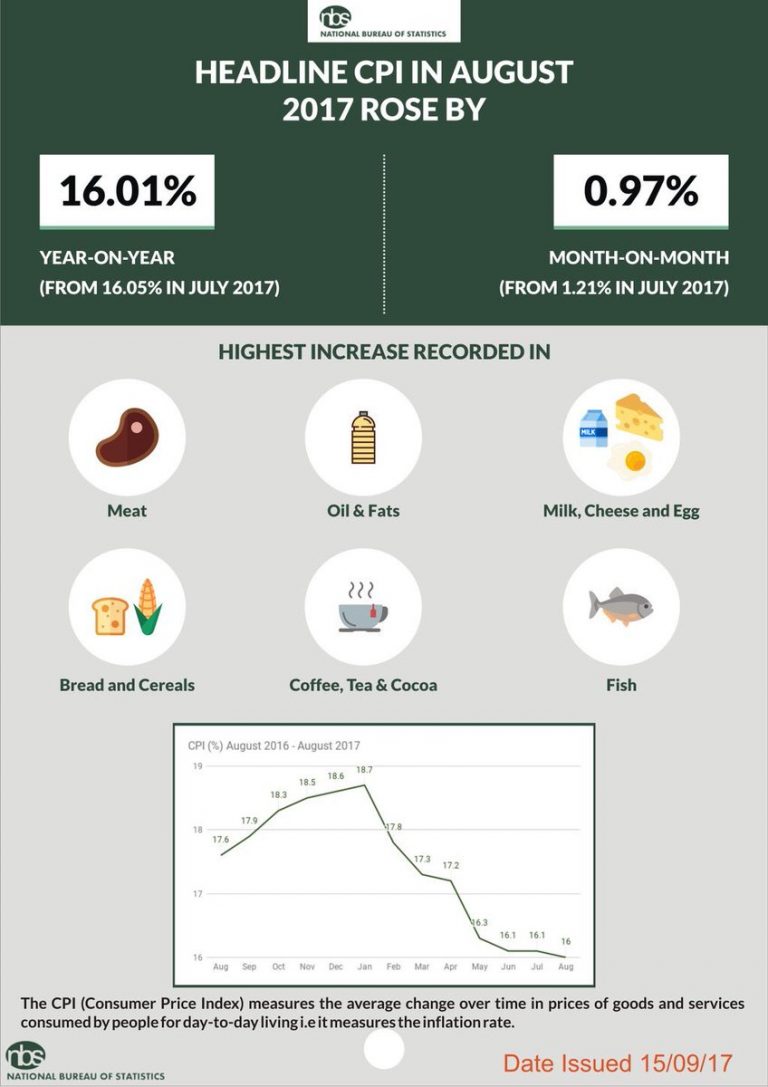For the seventh month in a row, inflation grew slower to 16.01% year-on-year in August from 16.05% in previous month, according to new data by the National Bureau of Statistics (NBS) on Friday, sustained by food inflation which was fueled by transport fare hike arising from the nation’s dilapidated road infrastructure.
Month-on-month, inflation in Nigeria climbed by 0.97% from 1.21% in July, with the highest increases recorded in the prices of meat; oil and fats; milk, cheese and eggs; bread and cereals; coffee, tea and coca; as well as fish.
One major component that sustained the high rate of inflation from the period remained food inflation, which remained high at 20.25%, compared to the previous 20.28%; and 1.1% month-on-month, down from 1.52% in July; buoyed by the prices of bread and cereals; meat, fish; milk, cheese and eggs, vegetables; oils and fats; many of which are imported items.
Core inflation also rose slightly from 12.2% in July to 12.3% YoY, but crawled to 0.93% from 1% in the preceding month, with clothing materials and other articles of clothing; passenger transport by air, motorcycles, shoes & other footwear, furniture & furnishing, non-durable household goods, books and stationary; as well as pharmaceutical products and maintenance as biggest contributors.
Inflation in urban areas rose to 16.13% from 16.04%; while MoM, the rate fell to 0.99% from 1.25% in July; just as rural inflation slowed down from 16.08% July to 15.91%, with 0.95% MoM from 1.18% in July.
In a selected food prices watch, the NBS data showed that tomato sold for N401.30 per kilogramme, up by 46.26% YoY and 1.82% MoM; while rice (local sold loose) went for N320.19/kg, representing a 10.68% rise YTD and 0.95% MoM; just as the imported high quality (sold loose) went for N394.35, represented 6.49% rise from the cost in August 2016, even as the price dropped 3.63% MoM. Yam tuber sold for N307.39/kg within the period, rising by 53.98% and 4.51% YoY and MoM respectively, despite the onset of the harvest season; the price of yellow gari (sold loose) increased by 59.76% YoY, but fell 1.32% MoM to N345.82/kg. White gari (sold loose) of the same measure traded for N310.15, up by 61.95%, but fell 2.19% YoY and MoM respectively.
Mudfish (dried) sold nationwide at N2,361.70 per kilogramme or 53.47% YoY; after dropping 1.42% MoM; while a kilo of fresh mudfish exchanged at an average of 1,070.57, after increasing by 20.28% YoY and 0.9% MoM
This may not be unconnected with the deplorable state of the nation’s roads that require fixing by government at all levels to rein in on transportation cost thereby easing access to city centres from farms across the country.
The bureau listed oil producing riverine states of Bayelsa, Rivers and Cross River as having the highest waterway passenger transport costs. While Bayelsa recorded N1,977.78 per average distance for the month, almost four times the national average; neighbouring Rivers followed with N1,850; and Cross River, N1.537.50. Three states of Kebbi, N240.14; Gombe, N172.89; and Borno, N145, had the lowest waterway passenger transport cost.
By motorcycle as a means of transportation, while the national average was N96.63; Rivers recorded N180.54; Edo, N166.25; and Akwa Ibom, N152, incidentally, all three states are in the South-South region. The lowest costs were recorded in Niger, N54.75; Katsina, N53.57; and Kwara, N50.
Transport fare across states, (bus journey intercity, state route, charge per person) stood at a national average of N1,425.80. The highest cost of intercity journey by bus in August was recorded in the Federal Capital Territory (FCT) Abuja, where it cost N4,800; almost double that of Adamawa at N2,533.33; while Niger had N2.300. The lowest costs were recorded in Abia, where intercity bus fare in N466.67; followed by Kogi, N550 per journey; Katsina recorded N912.50.
Average transport fare across states (bus journey within city per drop constant route) nationwide stood at N130.29; while Cross River recorded N292.31, making it the state with the highest bus fare; followed by Katsina with N250; and Ebonyi, N175. The lowest for the month was recorded in Borno, where it cost N47.50 to commute by bus within the city; followed by Anambra’s N59.29; and Enugu, N74.29.
Trending Today
Menu








